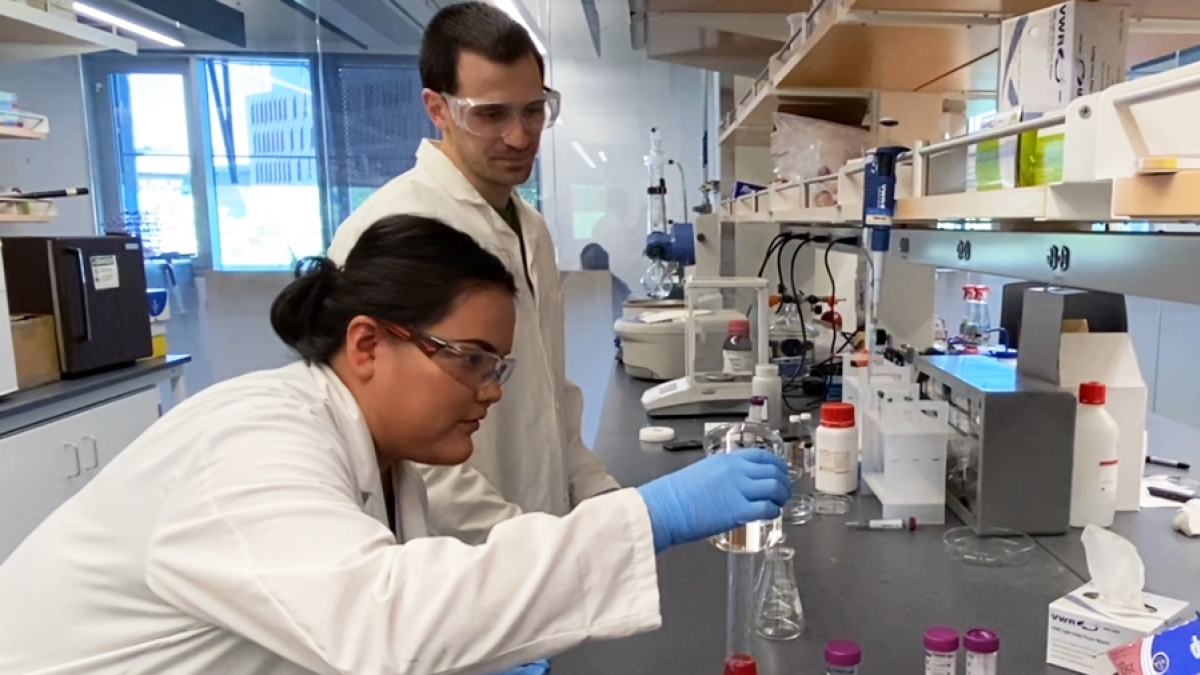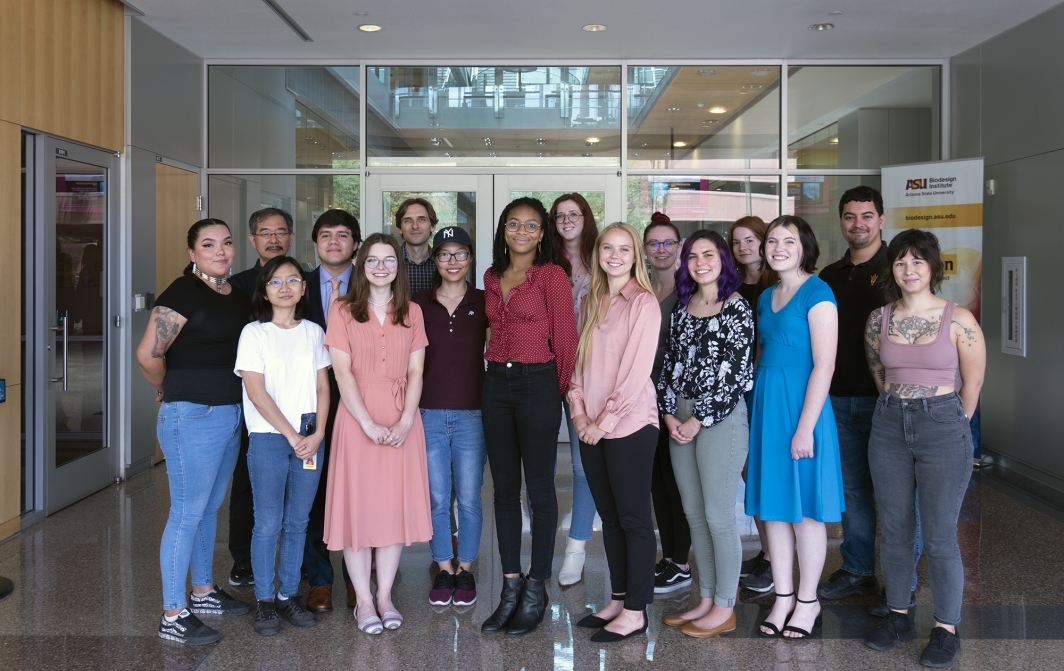8 students from across the country contribute to sustainability research at ASU

Mariah Paul from Diné College works with her graduate mentor David Ciota. Photo by Mary Zhu/School of Molecular Sciences
Faculty in Arizona State University's School of Molecular Sciences welcomed first-year students, sophomores and juniors to the Tempe campus this summer for a 10-week opportunity to perform sustainable chemistry and catalysis research, as part of the National Science Foundation’s Research Experiences for Undergraduates program.
The program provides students from primarily liberal arts and community colleges with opportunities to conduct research at some of the country’s leading research institutions.
In addition to receiving one-on-one laboratory mentorship, the participants attended professional development seminars and had the opportunity to present their results to a large audience of scientists.
The last time an NSF REU site was hosted by the School of Molecular Sciences was in the late 1980s. Admission to the program this year was particularly competitive; over 170 applicants vied for eight available positions.
Associate Professor Ryan Trovitch, a principal investigator on the project, was pleased with the program’s reception.
“I was very impressed with the applicant pool. At least two-thirds of those who applied are excellent candidates for an (School of Molecular Sciences) graduate degree program," he said. "With so many students having high GPAs and quality undergraduate experiences, we were able to put together a diverse group of students coming from across the country.”
Assistant Professor Laura Ackerman-Biegasiewicz, a principal investigator on the project, said, “During this program, we take students who have not had exposure to large instrumentation, research techniques or sustainable chemistry at their universities, and we pair them with faculty and graduate-student mentors at Arizona State. The students learn how to conduct research, but they also have workshops on professional development and career development. Additionally, they have the chance to explore Arizona and experience the benefits of living here.
“I’ve been surprised at how quickly the students became friends and began to support each other. There’s a real sense of community between the students in this program, and it didn’t take very long to develop.”
Courteney Dufrene, an undergraduate student at Nicholls State University in Louisiana, took part in the program.
“This has been a great experience,” Dufrene said. “Everyone is so helpful, and I’ve learned a lot in the lab that will help me after graduation when I pursue a PhD in chemistry and throughout my career.”
Dani Hill, a student originally from Virginia who is attending Scottsdale Community College, said, “At first I was in disbelief that I got into the program. I’ve been a sponge, learning as much as I can in the short time we were here. It was also a great networking opportunity which will help as I move forward in my education and wherever I do research.”
The primary focus of the program is to give the students hands-on experience in sustainable chemistry and catalysis, allowing them to develop environmentally friendly chemical reactions with societal benefits. One goal is for the students to make real advances in research and contribute to publications before they return to their undergraduate institutions.
This summer, the participants used Earth-abundant metal catalysts to prepare organic compounds and coatings, developed greener methods of preparing materials and studied protein-substrate interactions.
“I did a lot of work with catalysts to help develop reactions that have industrial applications," said particpant Michael Trimble, who attends St. Mary’s University in Texas. "Green chemistry reduces industrial waste and lowers costs, so it’s been exciting to be part of this program.”
In addition to Ackerman-Biegasiewicz and Trovitch, School of Moleculars Sciences professors Kyle Biegasiewicz, Christina Birkel, Matthias Heyden, Anne Jones, Don Seo, Jeremy Mills and Wade Van Horn served as mentors for the program, helping to train the next generation of scientists in their area of expertise.
Teaming up participating students with faculty mentors and graduate-student mentors helps students launch their early research careers in what can be an intense and highly focused program.
REU students with School of Molecular Sciences faculty and graduate-student mentors. Photo by Mary Zhu/School of Molecular Sciences
“The REU program provides students the opportunity to get hands-on research experience at a well-established research institution," said Sam Peoples, one of the graduate-student mentors. "They develop valuable professional skills, such as how to use lab equipment, how to be safe and conduct themselves properly in a lab, how to develop scientific concepts and also how to interact and collaborate with others.”
Graduate-student mentor Ariel Owens said, “This program provides a great opportunity for students who come from a college that doesn’t have the facilities or equipment available to students at a research university. I’m excited to have the opportunity to be a mentor and teach things that are important not only as a scientist, but also as a student, to help participating students learn skills that are important in academics and their future careers.”
The REU program will also be hosted at the school over the next two summers. For next year, Trovitch advises students to apply early.
“You don’t want to wait until the last minute. We only have eight spots, and when they’re gone, they’re gone," he said. "My other piece of advice would be to focus on making sure you obtain letters of recommendation from faculty who know your academic abilities well. Finally, you will want to write a solid personal statement about why you would like to pursue a career in research.”
“We are grateful to NSF to have a program like this,” Ackerman-Biegasiewicz said. “It’s significant for everyone involved to host students who infuse our own programs with creativity and enthusiasm. It’s an honor to get to know these young, bright students coming from all different backgrounds and walks of life.”
Video courtesy the School of Molecular Sciences
More Science and technology
2 ASU faculty elected as fellows to National Academy of Inventors
Arizona State University faculty members Bertram Jacobs and Klaus Lackner have been elected as fellows to the National…

Harvesting satellite insights for Maui County farmers
Food sovereignty can refer to having access to culturally significant foods, but Noa Kekuewa Lincoln believes it goes farther…

Google grant creates AI research paths for underserved students
Top tech companies like Google say they are eager to encourage women and members of historically underrepresented groups to…
